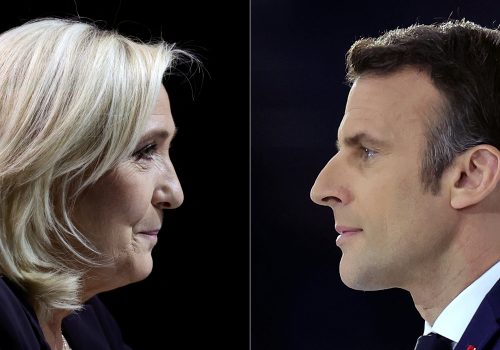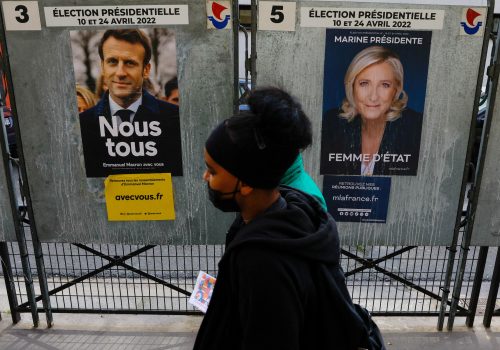FAST THINKING: Should Europe brace for a Le Pen presidency?
GET UP TO SPEED
A familiar French face-off is back—this time with even higher stakes. After earning more than 27 percent of the first-round vote yesterday, centrist French President Emmanuel Macron will attempt to stave off far-right challenger Marine Le Pen, who garnered 23 percent, in an April 24 runoff. But this rematch of their 2017 contest, which Macron won handily, is shaping up to be much closer amid the war in Ukraine and global economic disruption. Our experts break down Sunday’s results and predict what’s next for France and Europe more broadly.
TODAY’S EXPERT REACTION COURTESY OF
- Gérard Araud (@GerardAraud): Distinguished fellow and former French ambassador to the United States during the Hollande and Macron administrations
- Marie Jourdain (@MarieJourdain10): Visiting fellow at the Europe Center and former official with the French Ministry of Defense
- Dave Keating (@DaveKeating): Nonresident senior fellow at the Europe Center and Brussels correspondent for France 24
‘A field of ruins’
- If there’s one lesson from the past several years, Gérard tells us, it’s that Macron has failed to resolve the “political crisis” that catapulted him to the presidency in 2017: “French political life is more than ever a field of ruins: Macron is leading a centrist block of nearly 30 percent, but his only credible adversaries are extremists.”
- Also troubling, Marie believes, is an apparent lack of voter interest, which led one-quarter of eligible voters to simply sit out Sunday’s vote. “That is the second-highest abstention [rate] since French citizens started electing their presidents,” she notes.
- Many of those who did vote, Marie adds, seem to have taken a “tactical” approach by choosing the candidate they thought was most likely to perform well rather than their preferred choice. “As such, it is important not to overestimate support for the [leading] candidates’ policies,” she advises.
Subscribe to Fast Thinking email alerts
Sign up to receive rapid insight in your inbox from Atlantic Council experts on global events as they unfold.

Unreal reality
- In Brussels, Dave reports, there is less anxiety over a potential Le Pen victory than in 2017—when the triumphs of Brexit and Donald Trump were still fresh shocks—and even “a feeling of inevitability [about] Macron’s reelection.”
- But this attitude risks lulling officials into complacency, Dave argues. A far-right victory “would be no less of an existential crisis for the European Union now,” he explains. As the EU’s top military force, only nuclear-weapons power, and only permanent member of the United Nations Security Council, France under a Russia-friendly Le Pen could completely alter the bloc’s geopolitical trajectory. “The very future of the EU would be in doubt,” he tells us.
- What might that look like? In addition to nixing French sanctions on Russia (in what Dave says would be a “body blow to the West”), Le Pen could join forces with her populist allies in Poland and Hungary to “deconstruct the EU from within” while paring back Paris’s role in NATO. Nevertheless, Dave says, alarmism in Brussels hasn’t reached a fever pitch quite yet. “The attitude right now: Let’s cross that bridge when we come to it.”
Second-round rager
- As the runoff campaign kicks off today, Gérard notes, Macron will face the challenge of winning over hostile leftist voters while Le Pen might benefit from continuing her economy-focused strategy without diving too deep into “the most controversial aspects of her far-right program.” Macron’s “victory is anything but guaranteed.”
- And while all other presidential candidates—except those on the far-right—said they wouldn’t vote for Le Pen, Marie adds, it’s unclear whether their constituents will “be on the same wavelength.”
- What’s more, Marie reminds us, the near-term future will also be instructive: “The parliamentary elections in June will be critical for the winner to implement his or her chosen policies.”
Further reading
Sun, Apr 10, 2022
Experts react: It’s Macron vs. Le Pen, with Europe’s future on the line
Experts react By
Our experts break down the results of Sunday's first round of presidential voting in France and what they mean for Europe, NATO, and more.
Fri, Apr 8, 2022
French Election Dashboard: Everything you need to know about the presidential race
Trackers and Data Visualizations By
France will hold the first round of the 2022 Presidental Elections on Sunday, April 10, 2022. If no single candidate wins a majority after the first round, the two candidates who secured the most votes will participate in a runoff on Sunday, April 24, 2022.
Thu, Apr 7, 2022
How will Russia’s war in Ukraine reshape the European political scene? Look to France.
New Atlanticist By Marie Jourdain
France's presidential elections this month represent an important barometer of the strength of European populism. Here's how the war has already shaken the campaign.
Image: Marine Le Pen, leader of French far-right National Rally (Rassemblement National) party and candidate for the 2022 French presidential election, gestures as she appears on stage after partial results in the first round of the 2022 French presidential election are announced, in Paris, France, on April 10, 2022. Photo by Pascal Rossignol/Reuters.


